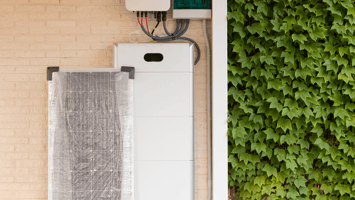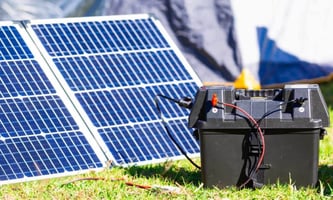It’s a common concern among solar panel owners – how long should you expect your batteries to last? If you’re asking yourself that question, don’t worry, we have the answer at Wolf River Electric.
We tell you how many years of service life you can expect from your solar battery. But first, let’s look at what happens when the sun goes down and solar power is no longer available.
Learn all about why batteries are essential for any successful renewable energy system, and get ready to discover exactly how many years you can count on having those reliable batteries at your disposal.
What Is The Lifespan Of Solar Batteries?
Solar battery lasts beyond their warranty life, typically for a minimum of 10-15 years. They come with 10-year warranties and can store solar energy for at least five more years after the term.
Solar panel battery technology is still relatively new, so there’s not much information about how long home batteries will last beyond the warranty period. Nevertheless, a well-maintained battery with a solar panel system can provide reliable solar power.
Types of Solar Panel Battery
Lead-Acid battery-Lead-acid batteries are the most common type of solar battery and have been used for decades. They are reliable, cost-effective, and require minimal maintenance. Lead-acid batteries can last up to 10 years with proper care and maintenance. They are also fairly efficient at charging and discharging energy.
Nickel Cadmium battery(NiCd) -These batteries are a more advanced type of solar battery. They are lightweight and have a longer life span than lead-acid batteries (up to 15 years).
Flow Batteries-Flow batteries are the latest development in solar battery technology. These batteries store energy in an electrolyte solution which can be pumped into the battery. Depending on the system’s energy needs, they can be scaled up or down.
Go Solar Today!
Factors That Impact The Life Of A Solar Battery
The following factors impact either directly or indirectly on solar batteries.
1. Solar Battery Type
The type of solar battery used will have a direct impact on the life expectancy of the system. Different types of batteries have different lifespans, and some may be better suited to long-term use than others. Lithium-ion batteries are typically considered the best choice for solar batteries, providing higher energy density and longer life than other types of batteries.
2. Solar Battery Usage
How a solar battery is used can significantly affect its total lifespan. Batteries regularly cycled through full charge, and discharge cycles will experience lower life expectancy than if the battery is maintained at optimal charge levels. Overcharging batteries can also lead to shorter life spans, and undercharging them can cause sulfation of the plates, reducing the battery’s useful lifetime.
3. Maintenance
Regular maintenance is key to extending the lifespan of a solar battery system. Keeping the batteries clean and free from dust, dirt, and debris helps maintain their efficiency and performance over time. Use a battery monitoring system to track the health of your battery and know when maintenance is needed.
4. Solar Battery Temperature
Extreme temperatures can significantly reduce the life expectancies of solar batteries. High temperatures accelerate chemical reactions inside the battery, causing shorter lifespans, whereas cold temperatures slow reactions, providing longer life.
5. Solar Battery Warranty
Warranties vary depending on the type and brand of the battery and can provide peace of mind if a problem arises. Longer warranties tend to indicate higher-quality batteries with greater lifespans.
How to Select the Solar Battery for Your Needs
Selecting the best solar battery for your needs requires careful consideration of particular elements listed below:
Cost
Solar batteries can come with a hefty price tag attached, so it’s important to consider your budget when selecting the right one for your needs. Lead acid battery for instance is less expensive than lithium-ion battery but has lower cycle lives. Remember also to factor in installation costs and compare different brands and models to find the best value for money.
Usage
Before selecting a solar battery, consider the size of your system and how much energy you will need to store. Different batteries come with different capabilities when storing power, so look at models based on their amp-hour rating and voltage potential.
Safety measures
Solar batteries carry high voltage, making safety a major consideration. Check for certifications from independent testing bodies like UL or TUV and read up on installation best practices.
Wrap Up: Solar Batteries Last Long If Well-Maintained
To recap, solar panel batteries can last for many years. This is great news for those looking for a cost-effective way to power their homes and businesses.
Solar panel batteries are long-lasting and help reduce carbon emissions, which should be a priority of anyone conscious of their environmental impact. Further, solar panel battery costs have decreased due to increased efficiency and reduced global demand for traditional energy sources like oil and coal.
Still, the question remains: how long do these batteries last? With proper care and regular maintenance, these batteries can often remain functional for at least a decade or more.
Frequently Asked Questions
No. Solar battery life is typically shorter than solar panels’. Most solar batteries will last 5 to 10 years, while most solar panels can operate for 25 to 30 years or more. The battery’s performance may decrease over time due to its energy storage capacity degradation.
It depends. The estimated time depends on the size and type of battery you choose for your solar system. If properly maintained, a large-scale solar battery can power your home for several hours or even days during cloudy weather or power outage.
The number of solar batteries you need for your home energy storage depends on the size and capacity of your solar system. For example, if you have a large residential solar system producing several kilowatts of energy, you may need multiple high-capacity batteries to store the excess energy.
Yes. Solar batteries are more expensive than other energy storage solutions and can be difficult to maintain and replace. Depending on the size and capacity of the solar battery storage system, a lot of space in your home or office may end up used, plus the solar storage may not be able to store the same amount of energy as other sources of power.
A solar battery can remain viable for up to three months without being charged. During this period, it uses backup power. However, it is important to remember that solar battery lifespan and performance can decrease over time due to degradation in its energy storage capacity.
Join Our Solar Community
Get exclusive access to the latest solar news, tips, and promotions!


